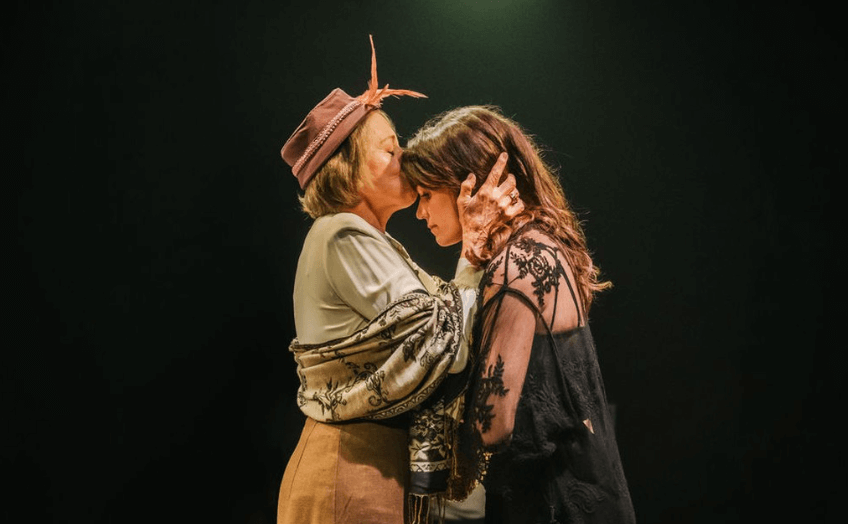Henrik Ibsen’s 1891 masterpiece Hedda Gabler has lost none of its bite – or shock value – after 133 years.
A new version, adapted by Toronto playwright Liisa Repo-Martell and now playing at Coal Mine Theatre, does an admirable job of updating the text for contemporary audiences, albeit with a few choices – written and directorial – which may raise some eyebrows.

Although we know from historical records the (overwhelmingly negative) critical response to the play, it’s still difficult to imagine what it must have been like for a 19th century audience at the premiere of Hedda Gabler.
A resolutely modern depiction of a difficult, complex, deeply flawed woman in the early days of what she has already decided will be a boring marriage – think Emma Bovary after the honeymoon’s over, but before the amputations start – Hedda is an astounding work of fiction, not easily interrogated or unpacked. Is Hedda a monster? A victim of circumstances (including a military upbringing, with a gun-toting general for a father, which Ibsen only tantalizingly alludes to)? Or something else entirely?
When Hedda begins, the title character (played by Coal Mine co-founder Diana Bentley) has just returned from a lengthy honeymoon with academic husband Jørgen Tesman (Qasim Khan). Hedda is deeply (and, judging by Tesman’s generally feckless character, understandably) disillusioned and disappointed by the trappings of married life. Bored by the six months of trailing the bookish Tesman – who she rarely refers to by first name – from dusty bookshop to dusty bookshop, Hedda is desperate for something, anything, to add colour to what she fears will be a long, dull life.
Enter Thea Elvsted (Leah Doz), lately fallen in love with none other than Hedda’s old flame Ejlert Løvborg (Andrew Chown). Thea has come looking for aid from her old friend Jørgen – though not so much from Hedda, who she remembers from their school days as a cold, haughty bully, a reputation which Hedda does little to disabuse. Also circling the proceedings is Judge Brack (Shawn Doyle), with his less-than-honourable intentions towards high-society beauty Hedda, and the always excellent Fiona Reid in a small but essential role as the put-upon Aunt Juliane (or, as Tesman insists on calling her to Hedda’s mortification, “Auntie Ju-Ju”).
Bentley, who recently announced her departure as co-artistic director of Coal Mine, is in fine form here, balancing Hedda’s shocking cruelty – there is something sick, malignant about her behaviour, particularly to those who confide in her – with some measure of humanity, even if that humanity has been twisted potentially beyond redemption. Bently manages to show us that Hedda is, to a degree, aware of that something darker and deeply flawed within her, though she proves incapable of ever really engaging with what it means, let alone her responsibility to protect others from it. What to make of Hedda Gabler has been a question plaguing audiences since 1891, and while this production offers no easy answers, Bentley, writer Repo-Martell, and director Moya O’Connell all manage to find something believably human about this character.
Also a standout is Doz as the lovelorn Thea Elvsted. Doz, who was so good in the very different The Effect, makes the most of her relatively limited stage time here, conveying Thea’s desperate, if well-meaning, love for dissolute academic (and rival to Tesman) Ejlert Løvborg. Even though Thea has her own sins to account for, Doz convinces us that she is the only sincere person in this rather vicious circle of comrades. It’s too bad then that Chown, in the role of Ejlert Løvborg, fails to do justice to the object of Thea’s affections, turning academic Løvborg into a lazy caricature – all hunched shoulders, staccato speech – when the role demands so much more of this rival to Tesman, whose rivalry runs both intellectual and romantic.
Doyle, on the other hand – lately the best part of the very bad recent seasons of Star Trek: Discovery – evinces a clear understanding of his role, playing Judge Brack with a sardonic edge and mildly lascivious nature. Khan is also fairly good as Tesman, the weak, ineffectual husband who has, through a cruel twist of fate, married the woman – Hedda – least suited to him, and he to her.
Repo-Martell – a renowned stage actress in her own right – definitely gets the feel of Hedda Gabler right, with able assists from director O’Connell and a suitably oppressive score by Emily “Metric” Haines. Repo-Martell even manages to find a great deal of unexpected humour in the exchanges between Hedda and the various members of her circle, particularly when Judge Brack is on stage. Other choices, however, ring false, as in the anachronistic (over)use of the word “literally” as an intensifier (“she literally didn’t know what to do”), and the even more anachronistic deployment of one particularly harsh profanity.
I don’t know if Repo-Martell actually speaks Norwegian, but whether this Hedda is a translation or simply a reimagining in the vein of Simon Stephens’s The Seagull, the effect of Repo-Martell’s text is to occasionally flatten the dialogue, stripping it of the nuance present in, for example Richard Eyre’s celebrated 2005 adaptation. Judge Brack is probably the worst victim of this, his subtle wordplay – referring to a proposed infidelity as “forming a triangle”, for example – undermined by Repo-Martell’s too-cute amendments – “triangle” here becoming “threesome”.
Still, minor criticisms aside, this Hedda – and Hedda – is one of the finest to grace Toronto stages in a very long time, and a crowning achievement for Diana Bentley and the theatre company she co-founded with husband Ted Dykstra.
***
Hedda Gabler runs now through June 2, 2024. Tickets here.



